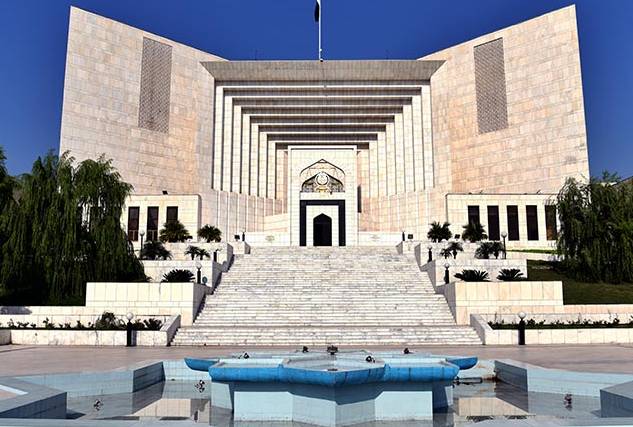Constitution, not parliament, is supreme, remarks SC judge
Justice Mandokhel says those convicted in May 9 cases did not belong to armed forces: Adds convicts were not ex-servicemen either: Asks why not cases of martyred Army personnel referred to military courts: Justice Hilali says military trials of civilians concern those who attacked APS: Justice Mazhar says Article 233 protects basic rights of citizens: SC seeks report on May 9 convicts: Punjab govt informs SC May 9 convicts being treated as per Jail Rules

Stay tuned with 24 News HD Android App

A Supreme Court judge remarked that the country's Constitution is supreme and not the Parliament as the apex court's constitutional bench resumed on Wednesday the hearing of the intra-court appeals filed against declaring the trials of civilians in military courts as null and void, reported 24NewsHD TV channel.
A seven-member bench, headed by Justice Aminuddin Khan, conducted the hearing today.
Khawaja Haris, counsel for the Ministry of Defence, continued his arguments in the case.
Khawaja Haris said that the basis of the apex court’s decision was Articles 5 (8) and 3 (8) of the constitution. “Both articles are completely different. They cannot be coalesced together,” he argued.
Justice Muhammad Ali Mazhar remarked that Article 233 safeguarded the fundamental rights of citizens.
Haris replied that Article 233 had two parts: one was related to the armed forces, while the other to civilians.
Justice Jamal Mandokhel said that citizens could not be denied their rights even under Article 5.
Haris recalled that it had been settled in the FB Ali case that civilians too could be tried in military courts. “Whether we agree with you or not remains to be seen,” Justice Mandokhel said.
The lawyer went on to say it was on the basis of a wrong interpretation that it was said that the FB Ali case was of a different nature. “Ali was tried after his retirement. At that time, he was a civilian,” Haris said, adding, “The judge gave the ruling that the defendant had committed the offence while he was in service; therefore his case was separate.”
Justice Mandokhel retorted, “Those convicted in the May 9 cases did not belong to the armed forces.”
These days, the judge added, a term of ex-servicemen was used. “These convicts were not ex-servicemen either.”
“Let’s only use the term of a citizen,” he said.
Justice Musarrat Hilali opined that when there was talk about the trials of civilians in military courts, it concerned those who had carried out an attack on the Army Public School (APS), Peshawar. “Can the same treatment be meted out to all civilians?” she questioned.
She reminded Haris that these days the constitution was not suspended.
Justice Mandokhel remarked that the Pakistan Army personnel were martyred on a daily basis. “Our prayers and sympathies are with them. But the question is, why aren't their cases brought to military courts?”
The judge asked whether that civilian who had anti-army views would also be tried in a military court. “The question is, which are the cases which should be referred to military courts?”
Addressing Haris, Justice Naeem Akhtar Afghan said, “It appears as if you have not prepared your case.”
The five-member bench had declared some of the sections of the Army Act null and void. “If we uphold the previous judgment, then forget that there could ever be military trials of civilians.”
However, Justice Afghan went on to say, if the bench reached some other conclusion, then it would have to determine which civilians could be tried in military courts.
“Now, an amendment has been made to the Official Secrets Act, 2023. Tell us in the light of that amendment,” the judge said to Haris.
Justice Mandokhel remarked that the parliament had the power to declare which act was an offence and which was not. “This is the constitution that gives the parliament this right,” he said.
The judge said it was said that parliament was supreme. “In my opinion, it is the constitution which is supreme.”
The court sought a report on the May 9 convicts and adjourned the hearing of the case until tomorrow.
May 9 convicts being treated as per Jail Rules
The Punjab government has said that all facilities are being provided to the civilians who had been handed down sentences by military courts in the May 9 cases as per the Jail Rules.
In its report submitted to the Supreme Court on Wednesday, the provincial government informed that of a total 28 such prisoners, 27 were in Punjab jails.
It said that at the time of the entry of these convicts in jails, the medical officer examined them.
It stated that quality cooked meals were served to the prisoners three times a day as per the official menu.
Furthermore, the government said, it had provided prisoners with beds and blankets as well.
The convicts had also been given the facility of meeting their family members every Friday, said the government, adding that on that day the families are allowed to bring with them meals, fruits and other items.
Thousands of people immediately took to the streets after hearing the news of the arrest of their leader Imran Khan on May 9.
They ransacked government and military installations besides setting the memorials of the Pakistan Army martyrs on fire.
Reporter: Amanat Gishkori
